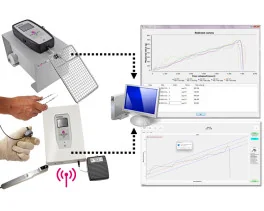Authors
M Lachaux, M Souli
Lab
INSERM U1096, UFR de Sant
Journal
Endochrinology, Diabetes and Metabolism
Abstract
IntroductionImeglimin, a glucose_lowering agent targeting mitochondrial bioenergetics, decreases reactive oxygen species (ROS) overproduction and improves glucose homeostasis. We investigated whether this is associated with protective effects on metabolic syndrome_related left ventricular (LV) and vascular dysfunctions.
Methods We used Zucker fa/fa rats to assess the effects on LV function, LV tissue perfusion, LV oxidative stress and vascular function induced by imeglimin administered orally for 9 or 90 days at a dose of 150 mg/kg twice daily.
Results Compared to untreated animals, 9_ and 90_day imeglimin treatment decreased LV end_diastolic pressure and LV end_diastolic pressure_volume relation, increased LV tissue perfusion and decreased LV ROS production. Simultaneously, imeglimin restored acetylcholine_mediated coronary relaxation and mesenteric flow_mediated dilation. One hour after imeglimin administration, when glucose plasma levels were not yet modified, imeglimin reduced LV mitochondrial ROS production and improved LV function. Ninety_day imeglimin treatment reduced related LV and kidney fibrosis and improved kidney function.
Conclusion In a rat model, mimicking Human metabolic syndrome, imeglimin immediately countered metabolic syndrome_related cardiac diastolic and vascular dysfunction by reducing oxidative stress/increased NO bioavailability and improving myocardial perfusion and after 90_day treatment myocardial and kidney structure, effects that are, at least in part, independent from glucose control.
BIOSEB Instruments Used:
Treadmill (BX-TM),Passive avoidance (LE870)

 Pain - Thermal Allodynia / Hyperalgesia
Pain - Thermal Allodynia / Hyperalgesia Pain - Spontaneous Pain - Postural Deficit
Pain - Spontaneous Pain - Postural Deficit Pain - Mechanical Allodynia / Hyperalgesia
Pain - Mechanical Allodynia / Hyperalgesia Learning/Memory - Attention - Addiction
Learning/Memory - Attention - Addiction Physiology & Respiratory Research
Physiology & Respiratory Research




































 Pain
Pain Central Nervous System (CNS)
Central Nervous System (CNS) Neurodegeneration
Neurodegeneration Sensory system
Sensory system Motor control
Motor control Mood Disorders
Mood Disorders Other disorders
Other disorders Muscular system
Muscular system Joints
Joints Metabolism
Metabolism Cross-disciplinary subjects
Cross-disciplinary subjects CONFERENCES & MEETINGS
CONFERENCES & MEETINGS 
